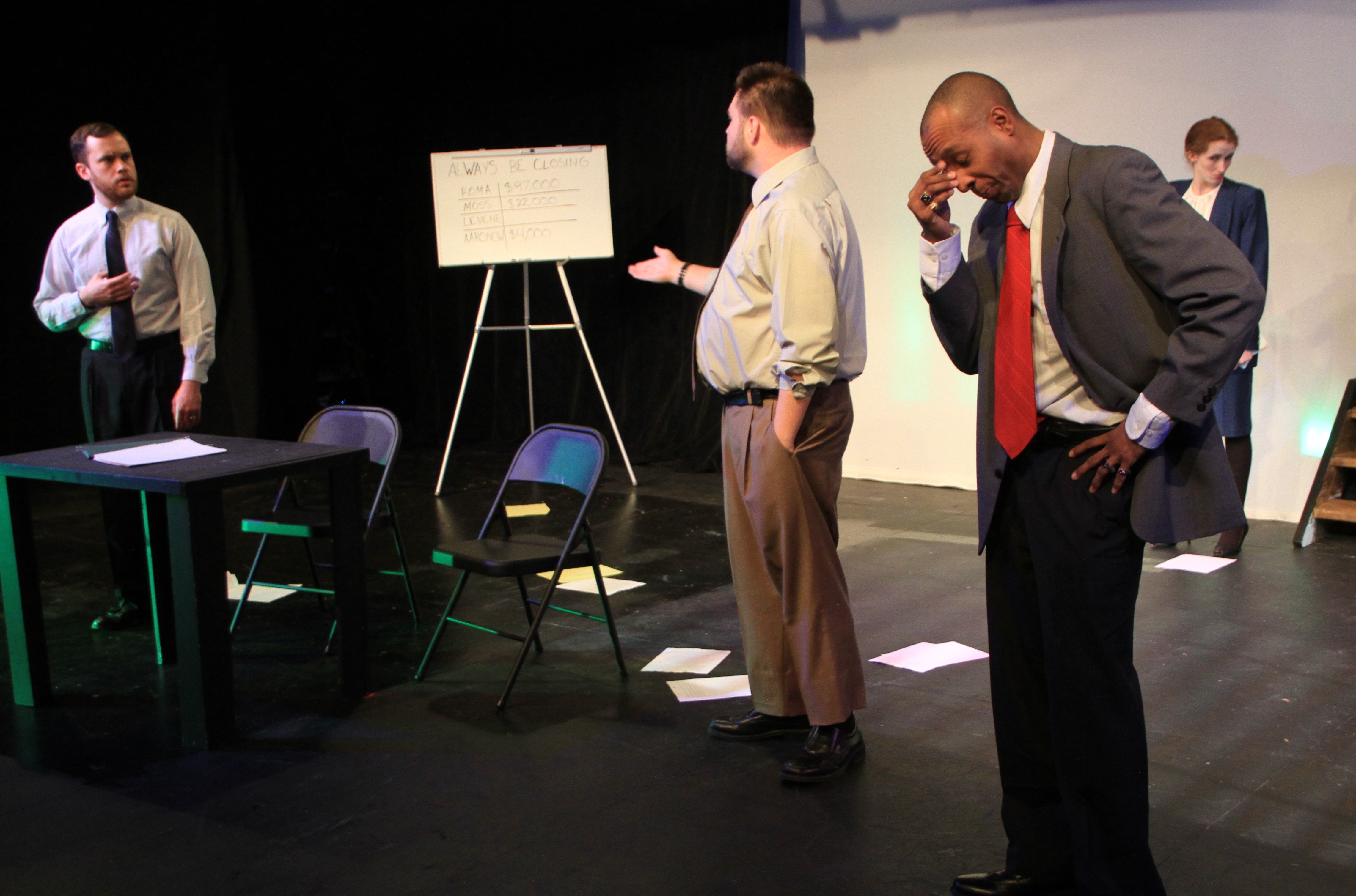SPRINGFIELD - “Sell” rhymes with “hell,” something David Mamet never lets us forget in his 1984 Pulitzer Prize winner Glengarry Glen Ross, set in a Chicago real estate office that’s about as cheery and chummy as a vipers’ nest. With apologies to Arthur Miller, death for these salesmen would be a relief; they are trapped in a torturous, endless purgatory of backstabbing, back-biting and brow-beatings.
In What A Do Theatre’s absorbing spin on Mamet’s masterpiece, director Joe Dely takes some chances, such as transforming scheming motor-mouth Dave Moss into Dana Moss (Betsy King) and updating the piece to the 21st century. Dely has pushed his actors to find the rhythms in Mamet’s profanity-peppered dialogue, and the effort pays off: The first act, in which we eavesdrop on three information-packed conversations that boldly establish the major characters and their situations, seems to fly by in about 15 minutes. The actors fire the sometimes-lacerating lines back and forth at each other while downing their lunches in a dismal Chinese restaurant.
Veteran salesman Shelley Levene (Jeff Stierle) is known as “The Machine,” but lately he’s been grinding his gears and misfiring, unable to get clients to close deals on his properties. Like his officemates, Levene craves “the leads” that are to them what blood is to vampires. These potentially lucrative morsels are doled out by highly discriminatory office manager Williamson (Ric Crow), who is often treated like a punching bag by his employees, at least until they realize how much they depend on his generosity.
As Levene makes an increasingly anxious plea for help, you can see his face heat up and sweat beginning to cascade down his face. Steirle superbly nails down Levene’s crumbling confidence and his hapless attempts to hide his sinking spirits by frequently patting himself on the back or lecturing Williamson about his shortcomings.
At another table, Moss and underachiever Aaronow (Bill Sutherland) complain about the brutally competitive atmosphere in the office, although it’s Moss who does 98 percent of the talking: Aaronow can barely get a syllable – much less a word – in edgewise. Barking out her innumerable grievances in a salty squawk, King takes the scene by the throat and never lets go. She’s funny, formidable and thoroughly convincing in her deviousness, which makes her great fun to watch. In the second act, as she whips around the office like a dust devil, her dangling earrings swing like pendulums and you may wonder if she’ll use them as weapons on anyone who crosses her path.
James King II has a slightly tougher time with Ricky Roma, the office’s alpha male. On opening night, he had the brusque arrogant aura of Roma, but did not always convey the necessary forcefulness and fury. King seems much more comfortable playing Roma’s charmingly crafty side, particularly when Roma uses flattery, evasion and vague promises of riches in an attempt to reassure weak-willed client Lingk (Dely), who is eager to back out of a purchase.
Thanks to Dely’s savvy direction of the ensemble, the rapidly escalating tensions in the office during the second half register strongly. Sutherland and Crow are very good at illustrating what happens when sad sacks like Aaronow and Williamson start coming apart at the seams, and the outbursts of friction are convincing and vivid. The clever incorporation of The O’Jays’ timeless For the Love of Money and Paul McCartney’s bizarre ditty Temporary Secretary also add a bit of additional flavor.
Although it’s difficult to believe that a modern real estate office could somehow function with no computers of any kind on the premises and that no one would have copied valuable data to a spreadsheet or a webpage before it was stolen, that’s about the only glitch that pops up in transplanting the story to 2017.
The rest of this production reminds us that, more than 30 years later, Glengarry is still premium property.





